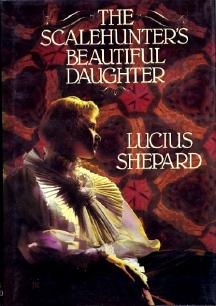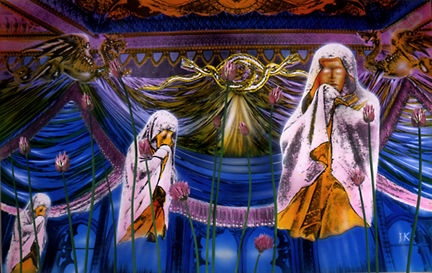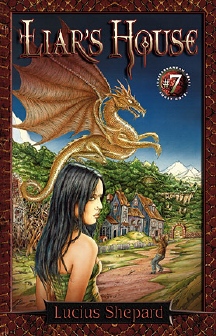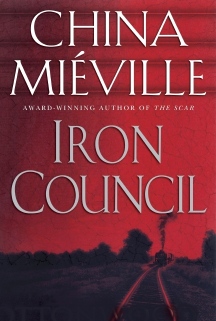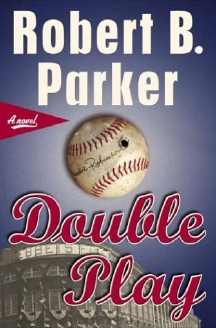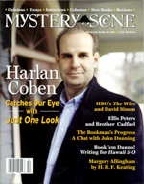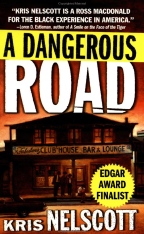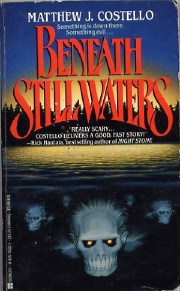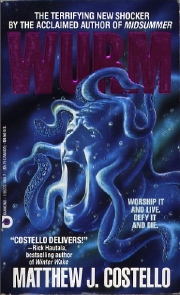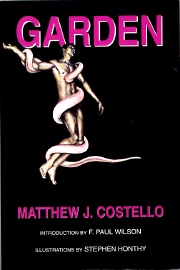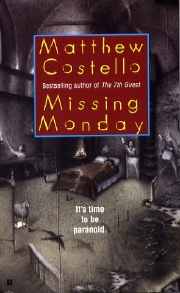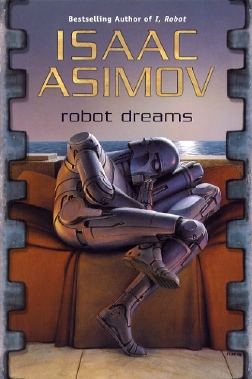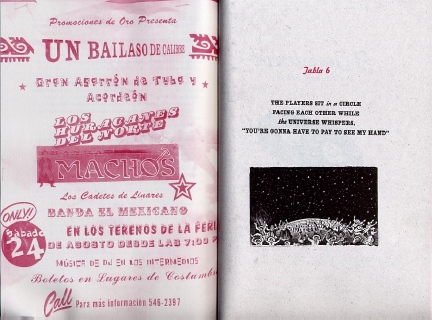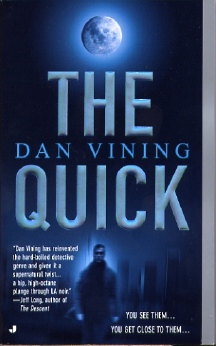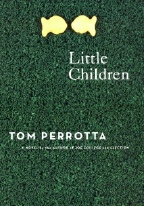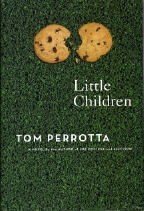|
|
|
This Just in..News from the Agony Column
|
05-21-04: Recurring Fantasies: Returning to Our Favorite Worlds with Lucius Shepard and China Mieville |
||||||||
Back
in the Dragon
One of my favorite Ziesing publications is his 1988 version of Lucius Shepard's 'The Scalehunter's Beautiful Daughter'. With a cover by J. K. Potter, this novella (well ahead of the current crush of wonderful novella's being published now) broke new ground in all sorts of ways. Shepard's fantasy featured one of the strongest and complex heroines we've ever seen in fantasy, though the world created by Shepard bears little semblance to what usually gets filed under fantasy. His Dragon Griaule is certainly unique. It's so large as to seem more like a range of mountains than a once-living being. The events that propel 'The Scalehunter's Beautiful Daughter' are compelling, exciting and unique. Within the confines of the carcass itself are civilizations that rise and fall with the cycle of what little life is left. It's an ecological work on the level of 'Dune', an unexpected surprise. And the societies that cling to this vast, sort-of -living creature are fascinating funhouse mirrors of those through which we find ourselves moving every day. If you've not read this story -- or even if you have -- you'll be well rewarded on a "book owning" level and a "book reading" level by taking the time to find a copy. And when you have, you might as well put in a search for 'The Father of Stones' another 1988 outing in the Dragon Griaule.
Most importantly, however, is the welcome ability to return to a wonderfully rendered world. Shepard's vision of the human communities that have grown around the remains of the Dragon Griaule is the perfect example of how fantasy can inform readers in the real world with an imaginative re-creation. Shepard's characters react to their surroundings, we understand, just as we would. I used to live quite near Disneyland, and no matter how spectacular (or tawdry) the locale, you eventually just get used to it. Shepard brings just the right sense of urban boredom to his fantasy to ensure that his stuff is etched in our minds. |
||||||||
Riding
the Rail With China Mieville
I've snagged an image from the cover of the US version, which I believe will come out contemporaneously with the UK version, meaning that you'll want to buy both, but that at least you only have to buy two US versions -- one to look at in awe and one to actually read -- in addition to the UK version, which you will certainly want to buy to look at in awe. Of course, you may want to buy two copies of that as well, since they're clearly one of the best investments you can make these days. I'll much more about the Mieville next week; keep an eye on the news page for announcements.
|
|
05-20-04: Robert B. Parker's 'Double Play', Mystery Scene's Photo Play, Kris Nelscott's Secret Identity |
|||||||
Hardball
& History
The first, 'Double Play' by Robert B. Parker, would have been an auto-buy anyway. As a long-time Parker fan, his books (some 40+ in total) take up more than a fair bit of shelf space in my ever so cramped library. 'Double Play' is a stand-alone book, combining a fictional bodyguard with baseball's first black major league player, Jackie Robinson. I'm normally not enamored of books that mix a fictional character with an actual historical figure (Stuart Kaminsky's Toby Peters novels always featured these "celebrity clients" and they stretched the boundaries of the PI genre just a bit past my personal breaking point). But, in Parker's case, I'll gladly set that prejudice aside in return for great dialogue, tight plotting, great dialogue, moral sensitivity and, did I mention, great dialogue. The baseball on the cover, with a bullet hole in the center, clues you to look for hardboiled; Jackie Robinson primes you to be ready for racial issues (Spenser and Hawk redeux?); the setting, Brooklyn in the 1940s, suggests historical detail; and the inclusion of actual box scores from games of the time tops it all off with authenticity and good 'ol baseball nostalgia. Sounds like a winner to me. – Terry D'Auray |
|||||||
Authors
Who Look Like Their, uh -- Books, yes, Books!
Robert Parker's classic "tough guy in black leather jacket with big dog on hopefully sturdy chain" has run for years on his Spenser series books. But he lightened up a bit and swapped the BIG dog for a friendlier-looking small dog for his Sonny Randall (female PI) series. For 'Double Play' (and, by the way, his Jesse Stone series) he's opted for a classic headshot, looking healthy (that's good), happy (that's also good), generally well pleased and approachably friendly. Does this suggest that the book is all that too? Well, maybe. Or maybe that book marketers are becoming savvier in speaking to the author's target reader. Or, most likely, that Parker is simply maturing, and quite well it seems. –Terry D'Auray
|
|||||||
Down 'A Dangerous Road' to the Forbidden Genre
Her mystery protagonist is Smoky Dalton, Chicago PI. The book is set in Chicago in 1968 and involves Dalton and his childhood pal, Martin Luther King midst the backdrop of social and racial unrest. Sounds like an interesting double-bill with Pelecanos' 'Hard Revolution'. Chicago versus Washington, D.C., PI versus cop, both stories of racial conflict, one written by a woman, the other by a man. –Terry D'Auray |
|
05-19-04: 15 years of Matthew J. Costello, 30 Satires by Lewis J. Lapham |
|||||||||||||||
From
'Beneath Still Waters' to 'Missing Monday'
Dinosaurs roamed the plains, New Wave music was not nostalgia and the horror genre raised foil covers over the publishing landscape. Those were the days (the old man said) when you could take your own bad self to a grocery store -- none of those darn "chain" bookstores required -- and find yourself a rack of books that was something to be proud of, not just a dozen rubber stamped-romance novels and ten copies each of last year's hardcover bestsellers in recycled mass-market paperbacks. You wanted a book with a skull on the cover and by crikey, you could get yourself a book with a skull on the cover. A screaming face from which sprouted sucker-laden tentacles? Check it out! And the small press sequel to a book about prehistoric invaders? Well that was what the Ziesing catalogue and manly independent bookstores back then (and now) were for, that and the UK imports of fine works from authors like Stephen Laws. Back then, when a man was a man and a monster was a monster (not a cultural icon, fercrissakes!), you could drag your booty home and sit up all night reading well-written but cheaply produced horror novels till your eyes fell out -- just like something in one of the novels you were reading. I read Matthew Costello's first novel, 'Beneath Still Waters', and enjoyed it more than I had any right to. Next up was 'Wurm', and well hell; how can you possibly go wrong with a cover like that a premise that involves a sort of 'Alien'-esque Lovecraftian revival of prehistoric worms from the deep-ocean volcanic vents? You cannot go wrong with that premise, and Costello turned it into a big, fat, foil-laden Apocalyptic tale of terror, perfectly suited for the slack-jawed enjoyment of unsuspecting English majors who happened to work at blood factories everywhere. This novel was so good that I specifically sought out and ultimately enjoyed the small-press-only illustrated sequel, 'Garden'. We're the garden, unfortunately. It turns out that soil doesn't have an easy time of it. That's around the time Costello hooked up with F. Paul Wilson, and the two have collaborated on a number of projects since, including a series of surreal commercials for the Science Fiction Channel. Costello's latest takes on the muted look of post-millennial fiction, but it's still Matthew Costello. The plot has an intriguing premise, as long as you can live without monsters. I suppose I can read at least one book without them! 'Missing Monday' starts for Janna on Tuesday. She doesn't remember a thing about the previous day, though her friends and co-corkers assure her that she was present and accounted for. It's a nice Twilight-Zone-style twist that allows Costello to unleash a tale of paranoia. Well, at least they want us to believe that it's paranoia, but we find ourselves in a world that offers a collection of satires by a famous publisher in the non-fiction section. If satire is now considered non-fiction, can paranoia be far behind? As a matter of fact, the bookshelves today are chock-a-block with non-fiction by famous authors that only two years ago would have been laughed off the shelves as conspiracy-theory nonsense. I do have to admit, that, reading those horror novels back in the 1980's, it was my thought that they would prove to be horror, and not, as it happens, particularly pre-cognitive science fiction that became unpleasant science fact. I must say, the monsters we have these days are particularly dull. Not a single sucker anywhere! Except, well -- you know. Spawn of Barnum and all. |
|||||||||||||||
An
Intellectual Pith Helmet
The New Press -- the publisher of this book -- is not just Yet Another Imprint that somewhere, far, far up the food chain feeds into one of the huge houses that tower over New York and thus, America. "The New Press is a not-for-profit publishing house operated editorially in the public interest." It's hard to believe that this statement is made in the very same world in which these essays were written. "The difference is that at The New Press, any profit earned on a particular title does not go to owners, but back into the production of other books." Given all this information, it's hard not to go buy that other book for the person you're going to annoy endlessly by reading to from this one. The New Press website is a pretty interesting venture that is not, apparently, either science fiction or horror. Or the result of either. Imagine that. It's not part of the standard science-fiction toolkit! |
|
05-18-04: The Resurrection of Byron Preiss |
|||||||
Isaac Asimov's 'Robot Dreams'
Now, some 20 years later, his work from the 1980's has been resurrected. Surprisingly, the movie his work is being tied-in to is not the CDE (Cheesy Digital Effects) fest titled 'Van Helsing', which gathers together all the above-mentioned monsters in one big cash-grab. Instead, Byron Preiss is being brought back into the limelight as with the impending release of the movie 'I, Robot'. Who needs the movie when you've got a collection of 20 stories by the man who essentially created robots for the English-speaking world? Of course, Karl Capek was probably the first to coin the term in his play 'Rossum's Universal Robots', in 1921. But it was those first paperback versions of Asimov's 'I, Robot' that touched generations. That said, the movie is directed by the talented Alex Proyas and David J. Schow has been on hand to chronicle the making of the film, surely a good sign. But I digress -- again. Preiss was the man who brought together 'Robot Dreams', a short story collection of the twenty best robot short stories by Isaac Asimov. That's kind of like saying the twenty best diamonds by DeBeers; Asimov had and has a lock on the robot story that won’t be unhinged until time itself comes to a halt. Preiss always brought a visual flair to his work, and the illustrations for this collection by Ralph McQuarrie are no exception. From the full-color cover to the many evocative pencil sketches, Preiss and McQuarrie illuminate the deep-thinking soul behind Asimov's fiction. From 'Little Lost Robot' to 'Strikebreaker', there are sure to be moments of recognition and moments of discovery here for every science fiction reader. It's a trade paperback at $14.00 that will take you back to the time when you were 14 years old and first probably read one of these stories. Can you really put a price on that feeling? |
|
05-17-04: Aye Caramba!, Hard Boiled LA Noir -- And Supernatural, One Fish, Two Fish, Goldfish, Go Fish, Mind the Gap |
|||||
Caramba! Nina
Marie Martinez Gets to the Volcano Via 1963 Caddy
I understand that in many ways, I'm just a bundle of self-contradictory
thoughts and inclinations. So, while I can't claim to have ever read a
graphic novel, because the whole lack of typeset pages thing bothers me
greatly, I can't get enough of illustrated novels and highly designed books.
For example, one of the great designed books of last year was 'The Thackery
T. Lambshead Pocket Guide to Eccentric and Discredited Diseases'. I absolutely
loved what John Coulthart did with the interior design and illustrations
of the book, keeping it constantly lovely and visually interesting.
The
novel is a sort of slippery-stream combination of humor and hallucination,
neither of which is common enough in the literary
landscape. And guys,
get this: this here is one of the few books that you buy that you can
hand off to the other half and see her smile instead of
saying "Now,
what are you on about?" And you can show your Doubting
Thomas most authoritatively: a book that's fun, full of
interesting meta-fictional
illustrative
touches and best of all, undeniably weird. This is, of course, the
highest recommendation that
I can give it. |
|||||
Hardboiled & Vine: The Quick by Dan Vining
In this novel, those circumstances include the traditional "monsters walk among us unnoticed" theme that has served so many writers so well. It's an easy claim to make, but it's much harder to make it pay in the realm of fiction. Still, this novel looks to hit some of the right marks; corruption in high places, coercion in low places and in a world run by unseen monsters. Of course we know by the latter that we're operating in a realm of fantasy, since in the real world, the monsters are all too apparent! |
|||||
One Fish, Two Fish, Goldfish, Go Fish: Talking With Tom Perrotta
And now that I've drawn out the suspense, here's the deal ladies and compulsive book-buying bookaholics. The original dust jacket illustration for 'Little Children' has two, yes count 'em two actual Goldfish™ -- or at least Goldfish™-enough-like shapes -- so as to excite the legal department of Pepperidge Farms. They were there for a reason; they play a part in one of the opening scenes of the novel. Knopf agreed to take them off, but only after the ones already shipped were gone. Everybody's happy, especially those who bought the first printings -- with the Goldfish™on the cover. You heard it here first. Now go buy one of the books, whatever the cover, and read it. If you're lucky -- and in the Santa Cruz area -- you can stop by Bookshop Santa Cruz, which is fortunate enough to have some signed copies. And while you're waiting for your copies to arrive, you can listen to the interview -- all 55 minutes of it, uncensored and uncut, talking about things that might get you in hot water on broadcast radio (in an utterly civilized and literary fashion, of course). I've uploaded both RealAudio and MP3 versions, schlepping the bits over to the server while I type this article. Fortunately for you, chances are you won't need to wait as long to download as I did to upload. In fact, chances are you can download the thing in the time it takes you read this, instead of the time it took me to write it. |
|||||
Mind the Gap: Alastair Reynolds 'Absolution Gap' Makes it to the US
|
